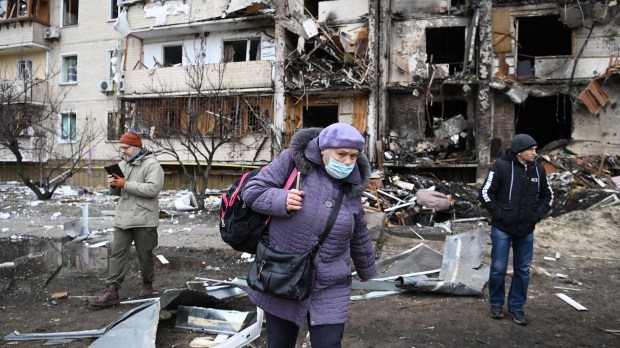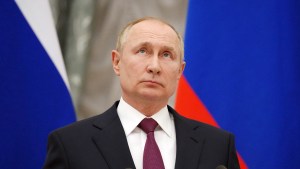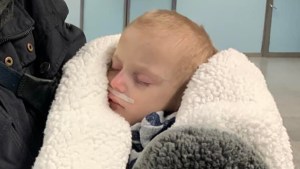The head of the Ukrainian Greek Catholic Church and other bishops have vowed to remain where they are, in spite of an intensifying attack on the country and its capital, an American Ukrainian bishop said Friday.
Archbishop Borys Gudziak of of the Ukrainian Catholic Archeparchy of Philadelphia said during a Zoom meeting hosted by a Catholic university in Ukraine that Major Archbishop Sviatoslav Shevchuk of Kyiv-Halych and bishops who head eparchies in Eastern Ukraine, as well as many priests are “staying in place.”
Archbishop Gudziak said that some priests, who, according to the Eastern Catholic customs are married, are taking their family members to the relative safety of Western Ukraine, “but are expected to go back” to the parishes they serve.
As he spoke, Kyiv faced a third night of bombardments, and the Ukrainian military strove to fend off an occupation of the capital by Russian forces. People who had not already fled to safer areas of the country were taking shelter wherever they could, including the subway system.
The Patriarchal Cathedral of the Resurrection, the seat of the Ukrainian Greek Catholic Church, was hosting a number of families sheltering in its basement.
Pope Francis called Archbishop Shevchuk on Friday to inquire about the situation in Kyiv and the status of the bishops and priests in the areas under assault, according to the Ukrainian Greek Catholic Church’s secretariat in Rome. The Pope assured Shevchuk, “I will do everything in my power.” Pope Francis gave his apostolic blessing to the Ukrainian people.
A prayer for Putin’s conversion
In Lviv, Archbishop Gudziak took part in a conference on “Social Justice, Human Rights, and Common Good: Facing the Danger of Totalitarianism,” held at the Ukrainian Catholic University, where he was rector for many years and now serves as president. In spite of the invasion of Ukraine that had begun the day before, the university decided to go ahead with the conference, which had been planned for a year, and devote the session to the current crisis and what it means for the Church. It was moderated by Volodymyr Turchynovskyy, dean of the university’s Faculty of Social Sciences and director of its International Institute for Ethics and Contemporary Issues. He was on campus along with several colleagues, but most attendees participated through Zoom.
Archbishop Gudziak himself was traveling and called in from Paris, where he served as eparch before becoming metropolitan archbishop of Philadelphia in 2019. He told the audience that he had just been on a one-hour call with Archbishop Shevchuk.
Gudziak added that the day before, he had visited the home of St. Therese of Lisieux in Normandy, where he “prayed for Vladimir Putin’s conversion.”
“Apocalyptic”
Also participating in the Lviv conference was Dominican Sister Helen Alford, vice-rector of the Pontifical University of St. Thomas Aquinas in Rome, who reported on a webinar she had just moderated at her own institution, titled “Ukraine: Church, Humanitarian Action and Peace.” The main speaker, Hugo Slim, Senior Research Fellow at the Las Casas Institute at Oxford Blackfriars, she related, offered an “pretty apocalyptic presentation on the current situation,” including “decapitation of the government, total destruction of the military, continuing policy of subjection to Russian power, and a comprehensive policy of Russification.”
“Because of the role of religion in Ukrainian life – as well as Russian life – the Church is probably the leading social actor, in many ways,” Sister Alford said. “It has the trust of the people that no other European country experiences. It has a unique role it can play. But it’s going to be sorely tested, because it’s going to be used as a tool by the occupying power, … to try to project the Russian Orthodox Church as a way of re-Russifying Ukraine.
In addition, there will be an attempt to try to split Christianity into a kind of East-West divide. “The Greek Catholic Church will be subject to really harsh suppression because it doesn’t allow this kind of East-West break,” Sister Alford said.
The Ukrainian Greek Catholic Church traces its origins to the Union of Brest in 1596, when several Orthodox eparchs agreed to enter into full communion with Rome in exchange for the assurance that they would be able to retain their Orthodox liturgy, spirituality and practices, including a married priesthood. Today, it is the largest of the 23 Eastern Catholic Churches in communion with Rome and, because of migration, has a presence far beyond its homeland.
But, in the present crisis, it faces perhaps its greatest challenge since it emerged from its illegal status under the Soviet Union in the late 1980s.
Decapitation
Another speaker at the Lviv conference, Oksana Kulakovska, director of the university’s Kyiv Center, presented perhaps an even darker outlook.
She said that Kyiv will probably soon be occupied by Russia, and “the first thing that will be done – we’re talking about a matter of days – Russia will do everything to behead the country as soon as possible.”
“There are lists prepared of those people who need to be killed, annihilated,” she said. “I believe this is something that will be happening in the near future. It’s something that really puts the state in a position of total dependence and elimination of a sense of a sovereign country.”
Later in the session, she clarified that when she spoke of the “decapitation of the country,” it meant more than merely the leadership of the government, “but about people who are passionate about the country, who put their all their efforts and their lives into building Ukraine’s sovereignty and freedom.”
In an email to Aleteia, Kulakovska said, “We do not know for sure what the complete list is – just information about some political and civic leaders. … But some university leaders are moral authorities and strong opinion makers in the country, so under conditions of full occupation they definitely might be under threat.”



